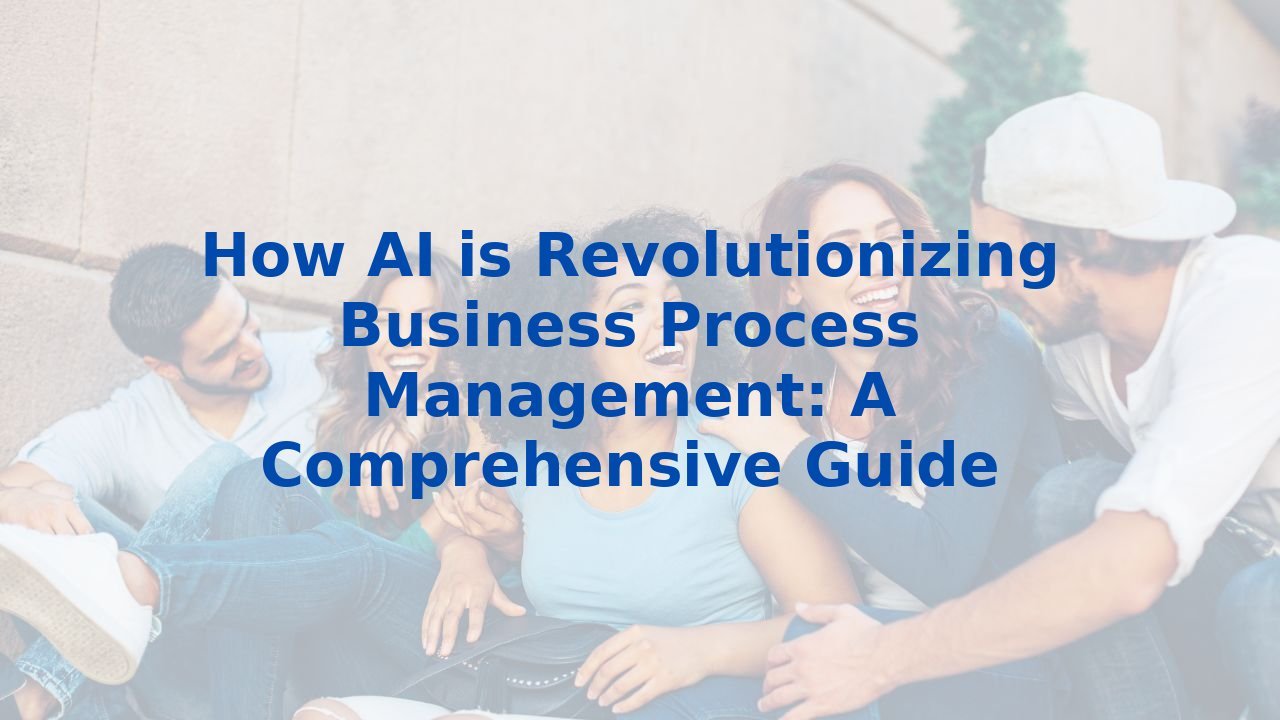How AI Is Revolutionizing Business Process Management: A Comprehensive Guide
How AI Is Revolutionizing Business Process Management: A Comprehensive Guide
In a rapidly evolving business landscape, the pursuit of efficiency is more critical than ever. One transformative force reshaping the way organizations function is Artificial Intelligence (AI). By refining Business Process Management (BPM), AI acts as a catalyst for excellence, enabling businesses to streamline operations, enhance productivity, and make more informed decisions. This comprehensive guide will explore how AI is revolutionizing BPM and the pivotal role employee training plays in this evolution.
Understanding Business Process Management
Business Process Management encompasses the methods and practices aimed at optimizing organizational processes. At its core, BPM seeks to enhance efficiency, effectiveness, and adaptability in a dynamic business environment. The introduction of AI into this realm marks a paradigm shift, offering sophisticated tools that transform how companies manage their processes.
AI Enhancements in BPM
AI integrates a variety of advanced technologies into BPM, including machine learning, natural language processing (NLP), and deep learning, which collectively enhance the ability to analyze data and automate processes. Let’s break down the key areas where AI can uplift BPM:
1. Process Discovery
AI’s capability in process discovery employs techniques such as process mining and pattern recognition to uncover existing workflows in organizations. This phase is vital as it unveils inefficiencies or bottlenecks that might remain hidden through manual analyses. By sifting through large datasets, AI can quickly identify patterns that lead to actionable insights, ensuring that problem areas are addressed efficiently.
2. Process Mapping
After discovery, AI assists in process mapping, converting insights into structured workflows. With the aid of machine learning, AI can visualize processes and pinpoint interdependencies, which keeps documentation current and accurate. These visual representations foster clarity among teams and improve accountability.
3. Process Automation
Process automation is where AI’s potential shines the most. By automating mundane and repetitive tasks, AI tools allow organizations to redeem valuable time and reduce the possibility of human error. Teams can then redirect their focus to strategic decision-making and creative problem-solving rather than being bogged down by routine jobs.
4. Process Management
Continuous monitoring falls under process management. With AI’s historical data analysis capabilities, organizations can adopt a proactive approach to managing processes. AI tools can alert teams about potential concerns in real-time, empowering management to act swiftly and maintain operational stability.
5. Process Improvement
Finally, process improvement is driven by AI’s data-driven insights. With the ability to conduct root cause analyses and predictive modeling, AI can suggest enhancements by monitoring real-time data. This feedback loop ensures that processes evolve continually, positioning organizations to thrive in competitive landscapes.
The Benefits of AI in BPM
Integrating AI into BPM yields remarkable benefits that can redefine an organization’s operational framework:
“AI is not just a tool; it’s a mindset that propels businesses into the future.”
- Enhanced Efficiency: Automation of repetitive tasks accelerates processing times and mitigates manual errors, leading to significant gains in efficiency.
- Informed Decision-Making: AI highlights trends and provides analytical insights, ensuring decisions are grounded in solid data rather than intuition.
- Real-Time Insights: With real-time performance tracking, organizations can recalibrate their strategies to respond effectively to immediate challenges.
- Cost Reduction: AI-driven efficiencies ultimately lower operational costs by reducing resource waste and streamlining processes.
The Role of Employee Training in Maximizing AI Potential
Even with the outstanding capabilities AI brings to BPM, it is crucial to emphasize the importance of training employees to harness its full potential. Why is training vital?
1. Understanding AI Tools
Employees must grasp the mechanisms of AI tools to seamlessly integrate them into their existing workflows. This knowledge maximizes tool efficiency and empowers staff.
2. Data Analysis Skills
Training staff in data analysis enables them to draw actionable conclusions from AI insights, fostering informed decision-making across the organization.
3. Adaptability and Lifelong Learning
As AI technology evolves, a culture of adaptability ensures that employees remain at the forefront of industry advancements, thereby enhancing organizational competitiveness.
4. Fostering Collaboration
Effective collaboration between humans and AI systems is essential. Training encourages this partnership, blending human creativity with AI precision for superior outcomes.
Conclusion
The integration of AI into Business Process Management is not just a trend; it’s a fundamental shift that holds the promise of unparalleled efficiency and productivity. By tapping into AI’s capabilities from process discovery to improvement, organizations can unlock new potentials, lower costs, and elevate decision-making processes. However, the human element remains indispensable. Investing in employee training allows teams to leverage AI tools effectively, ensuring long-term success in a competitive environment. Embrace the revolution and make AI your ally in achieving excellence.



